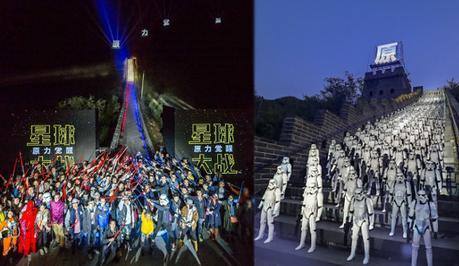And all of that comes without the benefit of playing in the world’s second leading market for film.
That’s what you saw a lot of in the early reports about Star Wars: The Force Awakens‘ galactic-sized box office. It was a necessary qualifier because the film to which Force Awakens was most often compared, Jurassic World, actually did have the benefit of opening in China the same time as the rest of the world, including the US. Whether or not Force Awakens succeeded or failed to beat one or Jurassic World‘s records, it was important to remember that it was doing all of it without any kind of boost from China.
Of course, no one actually knows what kind of boost Force Awakens will actually receive from China, but at this point it’s doing just fine without it, becoming the biggest domestic release of all-time, fourth biggest worldwide. Forget Jurassic World. Now, it’s all about Avatar. For example, FA took the domestic crown from Avatar, but does it have enough juice to make it all the way up to $2.79 billion to become the new worldwide champ? It’s currently sitting at $1.57 billion, but it’ll need a good showing in China to dethrone Avatar.
What Do You Mean China’s Never Heard of Star Wars Before?
Small problem: Star Wars doesn’t mean the same thing to China or other parts of Asia that it does to the rest of the world. As THR explained earlier this morning:
When the original Star Wars debuted in 1977, China was still emerging from the ravages of the Cultural Revolution, and Western entertainment was neither permitted nor of particular interest to the country’s traumatized and impoverished population. None of the first three films in the franchise ever got a wide release there, and when the prequel films came out in the early 2000s, the country’s exhibition infrastructure was still in its infancy. Revenge of the Sith grossed $11.7 million in 2005, which was considered a big success in China at the time.
Star Wars nostalgia — arguably the franchise’s most salient selling point in most places — is virtually nonexistent among China’s hundreds of millions of moviegoers.
You know how we’re all arguing about Force Awakens seeming too similar to A New Hope, a movie we’ve seen more times than we can remember? Well, a Chinese viewer might notice the similarities not due to cultural indoctrination but simply because they saw A New Hope for literally the first time last month, e.g., “Hey, isn’t this just like that one part in that one movie I just saw?”
So far, Force Awakens hasn’t awakened much in other parts of Asia, outperformed by local titles in South Korea, Vietnam and India. Could it similarly suffer a middling fate in China?
If so, it won’t be for a lack of trying. Here, according to THR, are the primary steps Disney has taken to aggressively promote Force Awakens and Star Wars in general in China:
Disney’s first step was to partner with Chinese Internet giant Tencent to make the entire Star Wars saga available for streaming online. In addition to the first six movies, Tencent’s digital Star Wars hub also rolled out an array of supplementary content, including shorts, behind-the-scenes features, official merchandise offers and more.
The studio then dispatched a small army of Stormtroopers to climb the Great Wall, creating a set of publicity images that promptly went viral worldwide, followed by the installation of life-size X-wings and TIE fighters in the public plazas of Beijing and Shanghai’s most fashionable shopping districts. J.J. Abrams, Daisy Ridley and John Boyega jetted east shortly after Christmas for a glitzy premiere held in Shanghai’s Grand Theatre, where an Imax screen was specially built for the event.
Remember when this was trending on social media last October?
 That’s not all. They also recruited the Chinese Justin Bieber:
That’s not all. They also recruited the Chinese Justin Bieber:
Most savvy of all, perhaps, Chinese pop star Lu Han was recruited to serve as an “honorary Jedi” and local promotional partner. The rising 25-year-old star’s boyish looks and influential online brand have earned him a reputation as “China’s Justin Bieber,” and he has been instrumental in building awareness among the young female Chinese demographic, which wields considerable influence over movie grosses. Han released a music video on Wednesday for his latest single, “Inner Force,” which features extensive footage from the film.
THR wasn’t kidding when they referred to Lu Han’s “boyish” looks. That dude’s 25? Wow.
Other efforts have included promotional spots on Running Man, one of China’s most watched reality shows, and a specially created set of shareable emoticons for QQ, the instant messaging service preferred by Chinese young people (think Snapchat).
 If it seems like a lot of that was designed to reach the kids it’s because it pretty much was. Check this: 16-35-year-olds accounted for 80% of total ticket sales in China in 2014. The comparable age groups in the US/Canada (18-24, 25-39) only combined to account for 46% of all ticket sales in 2014.
If it seems like a lot of that was designed to reach the kids it’s because it pretty much was. Check this: 16-35-year-olds accounted for 80% of total ticket sales in China in 2014. The comparable age groups in the US/Canada (18-24, 25-39) only combined to account for 46% of all ticket sales in 2014.
Hold on. China is going to be the leading market for film in 2017 (unless its economy falls apart, in which case we’re all screwed), and its box office is almost two times more youth-leaning than our’s? That’s going to obviously impact the types of movies Hollywood wants to make. Heck, it already has. Wow, man. That really makes you think.
And now back to all that Star Wars stuff:
Disney won’t be backing off from its campaign to educate the Chinese audience in the ways of the Jedi anytime soon. Rogue One: A Star Wars Story, co-starring Chinese action hero Donnie Yen, hits cinemas in less than a year. And when Walt Disney Co.’s long-in-the-making $5.5 billion Shanghai Disneyland Resort opens in the first half of 2016, it will feature an extensive Star Wars zone.
Source: THR

